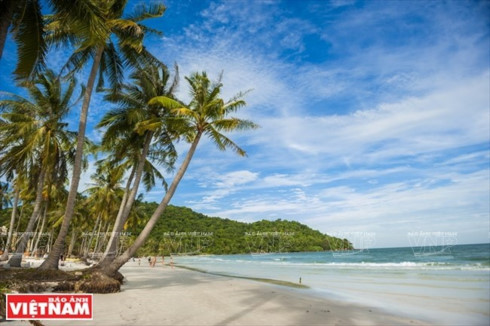
Phu Quoc and Mui Ne beaches of Vietnam have been listed among 20 most idyllic beaches in Asia by CNN travel.

Located in southern
Kien Giang province, Phu Quoc is frequently touted one of Vietnam’s most
beautiful islands and its renowned Bai Dai Beach is blissfully secluded with
white sands and expansive vitas stretching to the horizon, the website said.
Phu Quoc island district is well-connected with international airports, home to
luxurious resorts and foreign visitors can enjoy 30 day visa-free stay on this
island.
Phu Quoc is the largest Vietnamese island with a total area of 574 square
kilometres and a permanent population of approximately
85,000. In 2006, it was
recognised as a World Biosphere Reserve by UNESCO.
In the first five
months of this year, the island welcomed nearly 858,000 arrivals, more than 47
percent of the yearly target, up 21 percent from the same period last year. The
figure includes nearly 181,000 international tourists, or 60 percent of the
yearly target, up 30 percent year on year.
Meanwhile, Mui Ne beach in the central province of Binh Thuan is famous for
adventurous activities, particularly wind-surfing and kite-surfing, due to its
warm temperature and clear skies. It also consists of massive sand dunes,
suitable for activities such as sand-boarding.
Mui Ne boasts many attractive landscapes such as Hon Rom, Hon Lao Cau and Bai
Rang. Coming to this beach, travellers also have the chance to witness the
daily life of fishermen in a humble fishing village.
Other beaches on the list by CNN Travel are Yunokawa (Hakodata, Japan), Patnem
Beach (Goa, India), Tanjung Rhu (Langkawi, Malaysia) and Hikkaduwa (Sri Lanka),
among others.
Source: VOV
Located just a 20-minute drive from Hoa Binh City, Ora Hill Farmstay & Glamping Hoa Binh is a captivating new destination nestled in Mo hamlet, Bình Thanh commune, Cao Phong district. Combining farming with leisure, this tranquil retreat is perfect for those seeking balance, joy, and an immersive experience in the expansive beauty of nature.
Muong Bi - Tan Lac is renowned as one of the four famous Muong regions in Hoa Binh province. Blessed by nature with a favourable climate and stunning landscapes, Tan Lac holds great advantages for tourism development. The local tourism industry has made remarkable strides in recent times thanks to the attention and support from the local authorities and sectors.
With its strategic location, well-developed transport network, and diverse soil and climatic conditions, Hoa Binh is emerging as a must-visit destination in Vietnam's northwestern tourism corridor. The province boasts numerous attractions, including the Kim Boi hot springs (Kim Boi district), the Dau Rong cave complex (Cao Phong), the Mai Chau valley (Mai Chau), and the iconic Hoa Binh hydropower plant.
The northern mountainous province of Hoa Binh has been listed among the 71 most beautiful places to visit worldwide by the prestigious US travel magazine Condé Nast Traveller.
Hoa Binh province’s rich natural and cultural resources position it as a prime location for developing community-based tourism (CBT). In recent years, support from central and provincial policies, as well as assistance from non-governmental organisations, have encouraged local ethnic minority and mountainous communities to actively engage in the sector.


